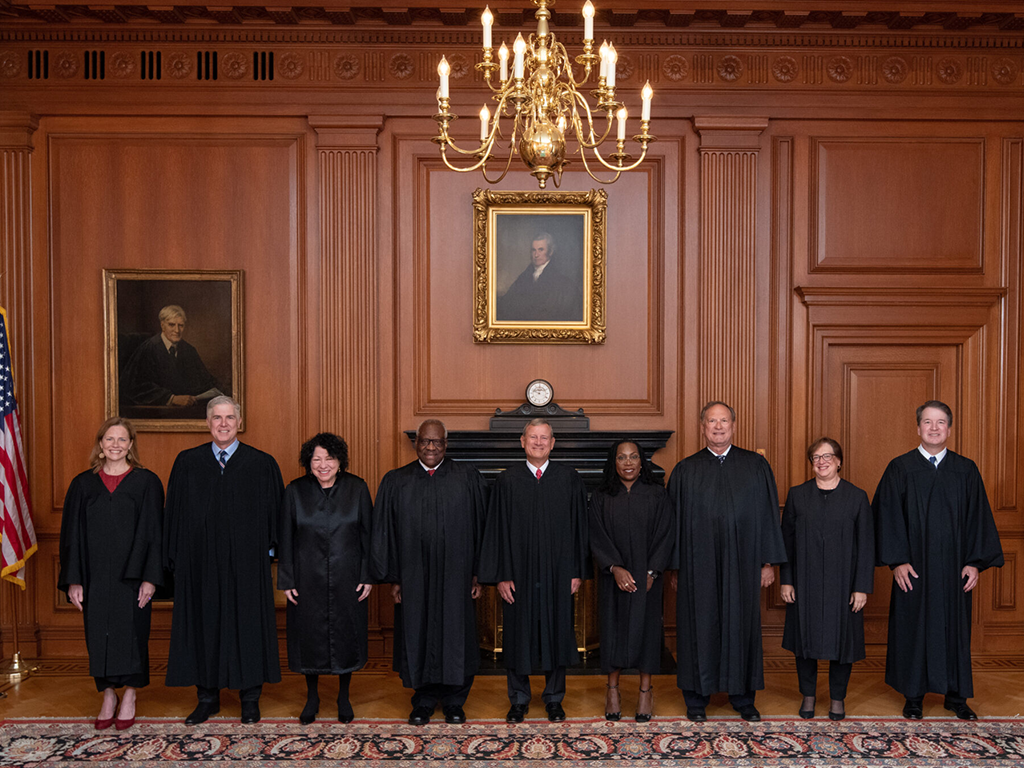Featured
SCOTUS Holds Arguments on “Birthright” Citizenship, But May Rule Concerning The Legitimacy of “Nationwide Injunctions.”
The High Court could use the case to rule on the issue of District Court judges issuing “Nationwide” injunctions.

President Trump’s Executive Order ending “Birthright” citizenship, issued at the very beginning of his second Administration, was almost immediately blocked by three separate District Court injunctions. The Supreme Court has now heard oral arguments on these cases on May 15, 2025. Pending a decision after the oral arguments, the Supreme Court left the three District Court Orders in place.
Following the oral argument, court watchers were unable to guess, with any degree of confidence, how the High Court will rule. It was evident that there was considerable division among the Justices, both on the issue of citizenship by virtue of birthright and on the issue of the jurisdiction and propriety of the lower federal courts issuing injunctions stymying the President and the Executive Branch through the use of nationwide injunctions.
Read the Supreme Court’s Order In Pending Cases (the “Scheduling” Order).
Court watchers considered the scheduling of oral arguments in May to be “unusual,” as the hearing occured only a few weeks before the High Court’s Summer Recess.
It is very significant to know that the Trump Administration’s request that the Supreme Court review these three District Court Orders did not request a ruling on the concept of birthright citizenship; instead, the DOJ only asked that SCOTUS “restrict the scope of multiple preliminary injunctions that purport to cover every person … in the country, limiting those injunctions to parties actually within the courts’ power.” How the Supreme Court will handle these three appeals is a huge question: It could actually rule on birthright citizenship, if that issue is fully argued and briefed, but the case more likely will actually deal with the request as stated in the appellate petition — that the High Court place limits on individual District Court Judges to issue nationwide (or “universal”) injunctions stymying the Executive Branch’s efforts to revise national policies. In effect, the DOJ only asked that the Supreme Court limit District Court Judges to dealing with the actual parties in their courts.
Per the DOJ Application:
current Administration. Courts have graduated from universal preliminary injunc-
tions to universal temporary restraining orders, from universal equitable relief to
universal monetary remedies, and from governing the whole Nation to governing the
whole world. District courts have issued more universal injunctions and TROs during
February 2025 alone than through the first three years of the Biden Administration.
That sharp rise in universal injunctions stops the Executive Branch from performing
its constitutional functions before any courts fully examine the merits of those ac-
tions, and threatens to swamp this Court’s emergency docket.”
Read the DOJ’s “Application for a Partial Stay of the Injunction“
Numerous District Court Judges have issued many such orders since President Trump returned to the presidency in January. Many of his efforts and Executive Orders have been blocked by these activist judges across America. Thus, a single judge with a particular political mindframe can prevent the President from implementing his agenda. At AmericanVantagePoint.com we reported on this issue in our article, “OPINION: Democrat U.S. Judges Collude to Thwart Trump Policies and Agenda.”
One of the first District Court judges to block Trump’s Executive Order on “Birthright” citizenship was U.S. District Judge John Coughenour in Seattle, who ordered the the Trump administration not to enforce the “Birthright” Order, that would have denied birthright citizenship to babies born of parents illegally in the United States.
“This is blatantly unconstitutional order,” Coughenour said during the court hearing, without even allowing the government lawyer to finish his argument.
The ruling was made in a case brought by the attorneys general of Arizona, Illinois, Oregon, and Washington state. It was one of several lawsuits filed almost instantly against Mr. Trump’s Executive Order. Judge Coughenour made his Order permanent two weeks later, indefinitely blocking President Trump’s efforts to end birthright citizenship for children born to parents without legal immigration status. The new nationwide Preliminary Injunction remains in effect until the case is concluded, unless overturned by a higher court.
The Trump Administration was never expected that the “Birthright” Executive Order would go unchallenged, and always anticipated that eventually this was a matter to be ruled upon by the Supreme Court. In this way, the Executive Order was only seen as the vehicle by which the issue would reach the Supreme Court.
Literally hours, not even a day, after President Trump issued an Executive Order ending “Birthright Citizenship,” a coalition of 18 states (all led by Democrat Attorneys General), and joined by two cities (also led by Democrat politicians), filed a lawsuit to oppose Trump.
Those states and cities joining together to block Trump’s efforts to end Birthright citizenship were California, Colorado, Connecticut, Delaware, Hawaii, Maine, Maryland, Massachusetts, Michigan, Minnesota, Nevada, New Jersey, New Mexico, New York, North Carolina, Rhode Island, Vermont and Wisconsin, and the cities of Washington, D.C. and San Francisco, California. In a 50-page Complaint, they claimed to be bringing “this action to protect their states, localities, and residents from the President’s flagrantly unlawful attempt to strip hundreds of thousands [of] American-born children of their citizenship based on their parentage.” They decried Trump’s effort “to abrogate this well-established and longstanding Constitutional principle by executive fiat.”
See the Complaint for Declaratory and Injunctive Relief.
The Executive Order, which by its terms was to go into effect thirty days after it was signed, states that children born here to women who are (1) unlawfully present in the United States or (2) temporarily authorized to be here, such as under a tourist visa or a student visa, and (in both cases) whose father was not a United States citizen, do not automatically receive U.S. Citizenship by virtue of being born on our soil. In signing the Executive Order, Mr. Trump stated that the United States was the only country in the world to award citizenship to anyone who happens to be born within its borders.
The Executive Order is based on Mr. Trump’s interpretation of the Fourteenth Amendment to the United States Constitution. The Fourteenth Amendment was passed after the Civil War, and its Citizenship Clause was written to assure that full citizenship extended to the newly freed Black population.
The citizenship clause in the 14th Amendment reads, “All persons born or naturalized in the United States, and subject to the jurisdiction thereof, are citizens of the United States and of the state wherein they reside.”
The interpretation of exactly what this means turns on the interpretation of the subordinate clause “and subject to the jurisdiction thereof.” What this means is not undefined, and is not a case of “first impression.” but though these words have been interpreted in the past, there is no new jurisprudence on this subject. AmericanVantagePoint.com discussed this issue in greater depth in our posting, “Does the Constitution Require “Birthright Citizenship”?”
Mr. Trump’s Executive Order defines which persons are “not subject to the jurisdiction” of the United States, for the purpose of determining citizenship upon birth, to include the following:
“Among the categories of individuals born in the United States and not subject to the jurisdiction thereof, the privilege of United States citizenship does not automatically extend to persons born in the United States: (1) when that person’s mother was unlawfully present in the United States and the father was not a United States citizen or lawful permanent resident at the time of said person’s birth, or (2) when that person’s mother’s presence in the United States at the time of said person’s birth was lawful but temporary (such as, but not limited to, visiting the United States under the auspices of the Visa Waiver Program or visiting on a student, work, or tourist visa) and the father was not a United States citizen or lawful permanent resident at the time of said person’s birth.”
Read the full Executive Order on Birthright Citizenship.












